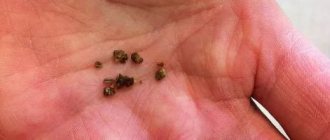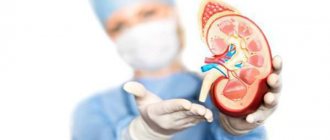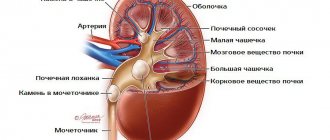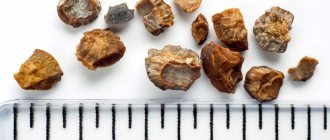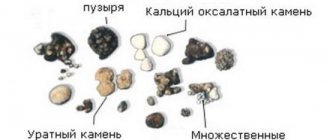Middle-aged and older people often suffer from the formation of kidney stones. The causes of the pathology may be different, but which of them are the main ones and which play a secondary role cannot be reliably said. It is believed that most often the factors that provoke the formation of kidney stones are genetic predisposition, chronic diseases of the excretory system, colds, and hypothermia of the pelvic organs. Nephrolithiasis also occurs due to altered composition of urine, impaired renal function and metabolic processes.
Causes
The formation of stones occurs as a result of crystallization of urine. Pathology can be caused by congenital and acquired causative factors. The former include genetic predisposition and congenital renal pathologies, and the latter are divided into external - exogenous and internal - endogenous.
External reasons that provoke the formation of stones are:
- improperly organized nutrition: excessive consumption of meat, salty, fatty and fried foods, smoked foods, preservatives, sour foods, abuse of tea, coffee and alcohol;
- sedentary lifestyle;
- taking diuretics;
- rehabilitation period after surgery;
- dehydration of the body;
- lack of vitamins D and A;
- excess calcium in the body;
- drinking water with a high percentage of lime salts;
- insufficient fluid intake during the day.
Internal reasons include:
- endocrine disorders (thyroid hyperfunction);
- osteomyelitis;
- osteoporosis;
- spinal injuries;
- gastrointestinal diseases: colitis, gastritis, stomach or duodenal ulcers;
This category also includes inflammatory diseases that create local conditions in the urinary tract: nephrosis, prostatitis, diverticulitis, nephrolithiasis.
The cure for stones in each case is selected individually, taking into account the reasons for their appearance.
Top 10 drugs from the pharmacy
Herbal medicine for kidneys is not addictive, so it is prescribed in long courses - from 1 month to six months. Herbal preparations are included in the treatment regimen for urolithiasis, cystitis, and nephritis. They can be used to treat pyelitis and chronic pyelonephritis. There is a list of the best and most effective drugs.
"Canephron"
The drug is available in solution or dragee. Active herbs are rosemary and centaury leaves, medicinal lovage roots. The drug is a natural herbal diuretic with a good diuretic effect. Additionally, it is an antimicrobial and antispasmodic agent, reduces inflammation.
Canephron
The drug is prescribed for the treatment of pathologies of the bladder and kidneys (cystitis, pyelonephritis, glomerulo- and interstitial nephritis) in a chronic form. "Canephron" prevents the formation of stones and is prescribed after surgical removal of stones. Prescribe with caution for liver pathologies.
Contraindications:
- excessive sensitivity to the components of the drug;
- ulcer in the acute stage;
- patient intolerance to lactose and fructose;
- age up to six years;
- glucose-galactose malabsorption;
- alcoholism;
- for edema in patients with heart and kidney failure.
Herbal medicine for kidneys is given to preschool children one tablet 3 times a day, for adults the dose of the drug is doubled. Drink plenty of water. After achieving a therapeutic effect, the drug is extended for another 14-18 days. The duration of the first course is determined by the doctor.
Side effects after taking the drug occur rarely, it is well tolerated. Sometimes mild nausea, vomiting, diarrhea or allergic reactions may occur. No drug overdose was recorded.
The price in the pharmacy chain is 480-530 rubles. Canephron is available without a prescription.
"Phytolysin"
Release form: soft dark brown paste in tubes. Suitable for preparing a suspension. The main extracts in the composition are sage, pine and orange oils, plus peppermint concentrate.
Plus active herbs:
- horsetail;
- goldenrod;
- lovage roots;
- birch leaves;
- bird knotweed;
- parsley and wheatgrass (plant roots);
- fenugreek seeds.
The drug acts as an anti-inflammatory, diuretic, and has an antispasmodic effect. It prevents the formation of stones and speeds up their removal. Prevents stones from increasing in size. The drug improves the filtration function in the kidneys without disturbing the electrolyte balance.
Indications: formation of stones and prevention of urolithiasis, cystitis, pyelonephritis in acute and chronic form.
Contraindications for use:
- phosphate urolithiasis;
- children under 18 years of age;
- allergy to the components of the drug;
- heart or kidney failure;
- glomerular nephritis;
- glomerulonephritis;
- nephrosis;
- nephrolithiasis;
- Prescribe with caution in diabetes.
The drug is taken 3-4 times every 24 hours, 1 tsp. after eating. Before use, dissolve the paste in ½ glass of sweet water. The duration of treatment is 14-45 days. The course is selected depending on the stage of the disease.
Side effects when taking the drug are rare. For example, a skin rash, attacks of nausea or allergic reactions. If the patient has increased sensitivity to ultraviolet radiation, photosensitivity may occur. No drug overdose was recorded.
Price in pharmacies – 390-450 rubles. Sold without a prescription.
"Cyston"
The drug is available in tablets. It contains lime silicate powder, mumiyo.
Active herbs:
- reed saxifrage;
- Vernonia;
- rough strawflower;
- heartleaf madder;
- extracts of Onosma bractifolia, Dicarpus stemum, membranous sativa.
The components of the drug are processed over steam from a plant mixture:
- horsetail;
- mimosa, teak and fava bean seeds;
- fragrant basil;
- pavonia;
- berries of creeping Tribulus.
The main direction of the drug is a diuretic, anti-inflammatory effect. At the same time, it has an antispasmodic and antimicrobial effect. "Cyston" reduces the concentration of substances that cause the formation of stones. Eliminates spasms in the bladder.
Indications:
- gout;
- cystitis;
- crystalluria;
- nephrolithiasis;
- stone formation;
- pyelonephritis;
- infections in the urinary system.
Contraindications are only excessive sensitivity to the composition of the drug.
The list of herbal medicines for kidneys includes Cyston.
When stones form, “Cyston” is drunk twice a day, 2 tablets. The duration of treatment is from 4 months to six months or until the stones are released. With complex therapy, the dose is the same until the disease is eliminated. To prevent relapses after surgery, two tablets are prescribed twice every 24 hours for 30 days. Then the dosage is halved over a course of 4-5 months.
Side effects may occur in the form of allergic reactions. No drug overdose was detected. The price in the pharmacy chain is 480-490 rubles. The drug is sold without a prescription.
"Urolesan"
The drug is released in gelatin capsules with powder or syrup.
Concentrates include:
- wild carrots;
- hop cones;
- oregano;
- fir;
- peppermint.
This is a combined drug that has a diuretic and antispasmodic effect. At the same time, it has a choleretic effect and acts as an antiseptic.
Indications:
- chronic cholecystitis;
- stone formation;
- dyskinesia of the bile ducts of the hyperkinetic type;
- cholelithiasis;
- complex therapy of infections in the kidneys and urinary tract.
Contraindications:
- alcoholism;
- intolerance to the components of the drug;
- hyperacid gastritis;
- age up to seven years;
- skull injuries;
- lactose intolerance;
- peptic ulcer;
- glucose-galactase malabsorption;
- stone size is more than 3 mm.
Capsules are taken from the age of 14, one three times a day, before meals.
For colic, take 2 pieces at once, then - 1. The course of therapy for exacerbation is 5-7 days, for a chronic course of the disease - up to 30. The syrup is prescribed to small children:
- up to two years at a dosage of 3-6 ml per day;
- from 2 to 7 years – 6-12 ml;
- from 7 to 14 years – 12-15 ml.
Adults are given the drug 5 ml 3 times a day. Side effects may occur from the gastrointestinal tract or in the form of allergic reactions. In case of overdose, nausea, vomiting, and diarrhea are possible. Some people experience attacks of dizziness. Price in pharmacies – 280-340 rubles. Available without a prescription.
"Nephrotin"
Release form: capsules. This is a dietary supplement that contains cranberry extract, bearberry leaves, golden rod and Lespedeza kopeechnikova.
Herbal kidney medicine serves as an additional source of flavonoids, arbutin, and polyphenolic compounds. The dietary supplement is recommended to improve the functioning of the genitourinary system, especially with a high risk of developing inflammation.
Contraindications: pregnancy, breastfeeding, intolerance to the drug components. Instructions for use: one capsule with meals, once a day. The course of treatment is a month. Side effects occur rarely, in the form of allergic manifestations (skin rashes). No overdose was recorded. Price in pharmacies – from 230 rubles. Available without a prescription.
"Trinephron"
Release form: capsules, drops for oral administration. Active herbs are rosemary leaves, centaury, medicinal lovage roots. The drug has a diuretic, antibacterial and anti-inflammatory effect. At the same time reduces spasms. Helps improve the condition of the kidneys and genitourinary system, normalizes urination, and relieves pain.
Indications:
- stone formation;
- glomerulonephritis;
- chronic and acute pathologies of the kidneys and bladder;
- interstitial nephritis;
- stone prevention.
Contraindications:
- pregnancy;
- renal failure;
- intolerance to the components of the drug;
- exacerbation of peptic ulcer;
- swelling associated with heart and kidney failure.
Children under one year of age are given the drug in drops, adults more often in capsules. From the age of 1 to 6 years, the medicine can be prescribed in any form. Children under 5 years old are given 15 ml 3 times a day. From 6 years of age, 25 drops are prescribed three times a day. Adults are given two capsules 3 times a day; for children, the dosage is reduced by half.
Side effects are rare and minor: itching, skin rash, urticaria. Nausea, vomiting, and diarrhea appear much less frequently. An overdose does not cause a dangerous life-threatening condition.
Price in pharmacies – from 440 rubles. Available without a prescription.
"Nephroleptin"
Release form: tablets. The composition of the drug includes lingonberry and bearberry leaves, licorice root, marigold flowers. Additional active substances are extracts of bird knotweed and propolis. The drug has anti-inflammatory, antiseptic and diuretic effects. They can replace antibacterial agents. Nephroleptin improves the functioning of the urinary system and kidneys.
Indications:
- treatment of pyelonephritis of any form;
- prevention of cystitis;
- infectious pathologies of the urinary system and kidneys;
- hypertension;
- urethritis;
- cystitis;
- polycystic disease;
- hydronephrosis;
- stone formation.
Contraindications – intolerance to the composition of the drug, pregnancy and breastfeeding.
For cystitis and pyelonephritis, take 2 tablets three times a day. In other cases, 1-2 pieces are given for therapy, 3-4 times a day, with meals. The course of treatment is 2-4 weeks. To prevent seasonal exacerbations of infectious pathologies of the urinary tract, Nephroleptin is taken in spring and autumn (at the beginning of each season) according to the standard regimen.
Side effects and overdose have not been recorded. Price in pharmacies – from 680 rubles. Available without a prescription.
"Ginjaleling"
Release form: capsules. The composition of the drug includes the roots of cylindrical imperata, leaves of curly strobilanthus and staminate orthosiphon, and the grass of phyllanthus Niruri. “Ginjaleling” has an antispasmodic effect and helps remove stones from the urinary tract. But as a diuretic, the drug is weak.
Indications – formation of stones, if their size does not exceed 0.6 cm. The drug is prescribed for complex therapy, for the treatment of nephrourolithiasis, inflammatory pathologies of the urinary tract.
Herbal medicine for kidneys has no contraindications. Prohibited only if you are intolerant to the components of the drug.
"Ginjaleling" take 2 capsules three times a day. As a preventive measure - one 3 times in 24 hours. The only side effects that can be observed are allergic reactions. There were no cases of overdose. Price in pharmacies – from 1500 rubles. Available without a prescription.
"Uroprofit"
Release form: gelatin capsules. They contain natural plant concentrates of horsetail, bearberry leaves, cranberries and ascorbic acid. "Uroprofit" has a diuretic, anti-inflammatory and antimicrobial effect. Is a natural antispasmodic.
To meet the daily requirement of vitamin C, two capsules per day are enough. With regular use of dietary supplements, urine output is normalized, the functioning of the urinary system and the condition of the kidneys improves, and the risk of developing edema, stone formation and chronic cystitis is reduced.
"Uroprofit" is considered not a medicine, but an effective biological additive (dietary supplement). It is recommended as an additional source of vitamin C and arbutin. The drug is used as an auxiliary drug for the prevention and treatment of pathologies of the urinary system, kidneys, and to prevent the formation of stones.
Contraindications are only intolerance to plant components, pregnancy and lactation. It is not recommended to give Uroprofit to children under 18 years of age. The drug is taken 1 capsule twice a day, with food. The course of therapy is no more than a month.
Side effects can be expressed in the form of nausea, vomiting, and stool disturbances. Sometimes abdominal pain and allergic reactions appear. There were no cases of drug overdose.
Price in pharmacies – from 410 rubles. Available without a prescription.
"Olymethine"
Release form: gelatin capsules with powder. It contains calamus, mint, olive and turpentine oils plus sulfur. The drug has antispasmodic, choleretic and anti-inflammatory effects.
At the same time it is a natural diuretic. The drug enhances ureteral peristalsis and loosens stones. Helps remove small stones and sand from the kidneys and gallbladder. Indications: prevention and treatment of nephrourolithiasis and cholelithiasis.
Contraindications include:
- hepatitis;
- intolerance to the components of the drug;
- glomerulonephritis;
- renal failure;
- urinary disorders;
- peptic ulcer;
- anuria.
"Olimethin" should be taken orally, half an hour before meals. For treatment and prevention, 1 capsule is prescribed, 2 times a day. For urolithiasis – 2 capsules 3-5 times a day.
Side effects include epigastric pain, nausea and vomiting. Allergic reactions and heartburn may occur. No cases of overdose have been reported.
Price in pharmacies – from 30 rubles. Available without a prescription.
Herbal medicines for kidneys are effective only in the initial stages of kidney diseases or to prevent them. They have fewer contraindications and can enhance the therapeutic effect if the main treatment regimen is medication.
Signs and symptoms of the disease
At the first stage of its development, the disease can occur without severe symptoms. In medical practice, there are cases when patients do not feel any discomfort in the presence of large kidney stones. They can be accidentally identified during a medical examination.
For this pathology, the characteristic symptoms are:
- aching and sharp pain in the lumbar region and back;
- increased pain during exacerbation of the disease and movement of stones in the ducts;
- frequent urination, accompanied by pain;
- cloudy urine;
- thirst;
- the presence of sand and blood in the urine;
- increased body temperature;
- increase in pressure;
- the occurrence of attacks of nausea accompanied by vomiting;
- weakness;
- decrease in the amount of fluid released when the bladder is emptied;
- swelling of the legs and face, caused by stagnation of fluid in the body.
Anxiety symptoms can intensify during physical activity, during sports activities and weight lifting. In this case, patients are given a drug that dissolves sand and formed stones in case of urolithiasis.
When are medications prescribed to remove kidney stones?
Medicines (tablets, syrups) can be used at all stages of the disease. The sooner you start taking them, the higher the chances of avoiding surgery. It is important that the patient pays attention to the symptoms of nephrolithiasis in time and consults a doctor. The disease can be suspected based on the following signs:
- aching, pulling sensations, pain in the lumbar region;
- discomfort that increases with heavy lifting, physical activity and after it;
- shooting pains from the lower back to the legs, groin area;
- cloudy, dark urine, possibly mixed with sand;
- discomfort when urinating, even pain;
- swelling of the legs, face;
- increased blood pressure due to kidney dysfunction;
- frequent thirst with normal water regime;
- weakness, sleep disturbance;
- decreased diuresis (decreased urine volume).
Review of tablets that break up and dissolve stones
Almost all medications for kidney stones used in urology are potent. They contain a high concentration of active components. Incorrect treatment can cause harm to the body instead of benefit. Therefore, the selection of medications should be carried out by a urologist based on examination data.
Of primary importance is:
- urine acidity level;
- the size of the stones and their chemical composition;
- presence of concomitant diseases;
- general condition of the patient.
If the elimination of formations in the kidneys is carried out with medication, when selecting therapy, it should be taken into account that urates and phosphates dissolve better than stones that contain ammonium and calcium salts of oxalic acid.
To ensure the dissolution and flushing of stones, it is important to organize the correct drinking regime, follow a special diet and use high-quality drugs for the treatment of kidney stones.
Oxalate dissolving tablets
The following medications show fairly high effectiveness:
- Cholestyramine. A synthetic lipid-lowering drug, which is an anion exchange resin, the action of which is aimed at the formation of non-absorbable bile complexes. The active substance of the drug, cholestyramine, binds to oxalates and begins to act when it enters the gastrointestinal tract. Reduces cholesterol levels, prevents its absorption in the intestines, destroys formed stones, reduces oxalate substances in the urine, the content of triglycerides and beta-lipoproteins in the blood and removes harmful compounds from the body.
- Cyston. An effective drug based on plant extracts. Dissolves stones, promotes their removal and does not affect the acid-base balance of urine. It has a diuretic, anti-inflammatory and analgesic effect, has antibacterial properties, relieves spasms, and prevents the process of stone formation in the urinary system. It has contraindications: individual intolerance, stone size more than 1 cm.
Drugs for dissolving kidney stones are well tolerated by the body and can be combined with other medications.
Drugs for the treatment of urate
When uric acid metabolism is disrupted, salts begin to be deposited in the kidneys, gall bladder and joints.
Effective medications for removing kidney stones:
- Potassium citrate. The drug is prescribed to patients with normal levels of calcium in the urine. The medicine regulates the acidity of the stabilizing agent, dissolves uric acid formations, helps minimize relapses in urolithiasis and nephritis, and normalizes kidney function.
- Allopurinol. An effective remedy for kidney stones, suppressing the synthesis of uric acid, reducing its level and preventing the deposition of urate. The active ingredient of the urological drug is allopurinol. A contraindication to its use is renal failure. You cannot interrupt the course of treatment.
In parallel with taking tablets to remove stones, patients are recommended to adjust their diet aimed at reducing the acidity of urine. With this approach, urates dissolve more easily.
Medicines for phosphates
If there are phosphates in the kidneys, a diet is required with the introduction of foods that increase the acidity of urine: sweet and sour fruits and meat.
Effective medications for kidney stones:
- Pills Spilled. Urological drug based on herbal ingredients. Contains tannins, organic acids and a loading dose of potassium. Dissolves phosphates, increases the frequency of urination, and promotes the removal of stones. The course of therapy can vary from 3 to 6 weeks.
- Spilled Super Septo. A capsule preparation designed to enhance the effect of the above pills.
- Madder extract. The active components of the drug have a diuretic effect, increase the acidity of urine, remove phosphates and reduce pain sensitivity when they are released. Contraindications to the use of the plant extract are: stomach ulcer, kidney failure, glomerulonephritis. When large stones are removed, there is a possibility of blockage of the urinary ducts.
Effective remedies for kidney stones
The main objectives of treatment with urolithiasis tablets are the crushing and removal of kidney stones along with urine.
Since formations occur if the acid-base balance and metabolism are disturbed, the composition of the stones varies, therefore, medications must be taken depending on the specific type of stones.
The list of medications is very long, so when kidney stones bother you, treatment with tablets that break up the stones is carried out by the attending physician based on a study of the composition of the stones.
Medicines for dissolving urates
Agents that reduce the accumulation of uric acid can dissolve urates. In this case, the following is prescribed:
- Allopurinol. The action is aimed at inhibiting the enzyme responsible for the synthesis of uric acid, thereby reducing its accumulation. The drug rarely causes side effects. Contraindicated in patients with renal and hepatic insufficiency.
- Potassium citrate. Responsible for binding calcium in the urine, it prevents its crystallization. Potassium citrate also alkalinizes urine, which prevents the formation of urate stones.
- Purinol. Reduces the synthesis of uric acid, promotes the deposition of existing urate deposits, and also prevents their formation.
Preparations for phosphate deposits
To crush phosphate stones, urine is acidified. For this, the following tablets are prescribed:
- Madder extract. The plant-based medicine has a high destructive ability. There are almost no side effects.
- Phytolysin. The essential oils and herbs included in the composition help soften and destroy stones directly in the kidneys, thereby facilitating their removal.
Oxalate Remedies
The stone, consisting of oxalate salts, dissolves very poorly, so treatment takes a long time.
The following tools are shown:
- Asparkam. The most effective and common remedy for oxalate deposits. It is a cardiac drug, so it should be taken under medical supervision.
- Cholestyramine. Once in the body, the drug interacts with oxalate salts and prevents their absorption. It also acts on existing deposits, turning them into sand and effectively removing them with urine.
- Canephron. A drug of natural origin, used to get rid of any stones.
It should be remembered that self-medication if you are diagnosed with urolithiasis can be hazardous to your health.
You should take appropriate medications only after a doctor’s prescription.
Principles of litholytic therapy
Treatment with tablets that dissolve and break up kidney stones of various chemical compositions and remove them from the body will be effective only if certain conditions are met:
- When choosing a treatment method, first of all, you should clarify the size of the stones formed. Medications for crushing kidney stones will be effective only in cases of small stones, up to 0.5 cm in size;
- Also, for the correct choice of drug, it is important to find out exactly what chemical compounds form the stone, since most medications have a therapeutic effect only on a certain type of stone;
- The presence of concomitant diseases that limit the use of certain individual drugs and even entire drug groups also plays an important role.
So how to dissolve kidney stones and prevent the formation of new stones?
Urate
To cure uric acid stones, it is necessary to reduce the content of uric acid, which provokes the formation of urate stones. To do this, the doctor prescribes drugs that regulate purine metabolism and change the urine pH towards alkolosis to an alkaline or slightly acidic reaction. Conservative therapy for urate stones is quite long, at least 2 months, and depends on the size of the stones.
The following drugs for kidney stones have been shown to be highly effective in treating disorders of the metabolism of purine bases, leading to an increase in the concentration of uric acid:
- Blemaren. The drug alkalinizes the urine environment to levels that are optimal for reducing uric acid content, dissolving urate stones, and also preventing the formation of stones. Prescribed individually, 1-2 scoops 2 to 3 times a day after meals. Before use, granules or effervescent tablets should be dissolved in clean water or fruit juice. Throughout the course of treatment, the patient should monitor urine pH three times a day using the indicator strips included in the kit;
- Magurlit. Shifts the pH towards alkalization, helping to normalize purine metabolism. Take 2 g three times a day. In the evening, the dose can be increased to 4 g. The drug requires constant monitoring of the acid-base balance of urine;
- Allopurinol. A drug that disrupts the formation of lactic acid and promotes the dissolution of urate stones. Take from 1 to 3 pills with a dosage of 0.1 g once a day. If effective therapy requires drinking more than 0.3 g per day, the total daily dose is divided into several doses;
- Ugly. The medicine dissolves urate stones and helps remove them from the body.
To effectively treat kidney stones with tablets, you should drink at least 2 liters of water per day throughout the course of therapy.
Oxalate
With a large intake of oxalic acid into the body through food, as well as with increased formation of it in the body, stones consisting of oxalates are formed in the kidneys. Getting rid of such formations is somewhat more difficult than getting rid of urate stones, but it is also possible.
The following medications break down oxalates:
- Magnesium oxide. Helps restore the formation and breakdown of oxalic acid. It is prescribed in a course of 0.3 g three times a day for 10 days to one and a half months;
- Asparkam. This cardiac drug normalizes the body's magnesium and potassium levels, which helps restore metabolism. Thanks to this, the body independently copes with excess oxalic acid, dissolves small stones and removes them from the body with urine. Take 1 tablet 3 times a day for 2 to 3 weeks;
- Cholestyramine. Binds oxalates and removes them from the body. Prescribed 1 teaspoon 2 to 4 times a day;
- Blemaren will also help with oxalates. The drug should be taken in the same way as in the treatment of urate nephrolithiasis;
- Xydiphone. Regulates calcium metabolism, promoting the dissolution of oxalates. The drug is available in the form of a 20% solution, and before use it is necessary to add 450 g of boiled water to 50 ml of the drug. Drink 1 tablespoon three times a day half an hour before meals.
Recovery will also be facilitated by taking vitamins B1, B6, A and E. You should also drink at least 2.5 liters of alkaline water throughout the course of treatment.
Oxalate stones are quite difficult to remove from the body, therefore, for the therapy to be highly effective, you should take medications prescribed by your doctor, trying to avoid interruptions in treatment.
Phosphate
Due to a diet that creates an alkaline urine environment, as well as in case of infectious diseases of the urinary tract, phosphate stones begin to form in the kidneys.
In this case, drug dissolution of stones should be started as soon as possible, since phosphate stones tend to grow very quickly. In a short period of time, the stones become so large that they can only be removed surgically.
Phosphate nephrolithiasis is well dissolved by drugs that loosen stones and inhibit the absorption of phosphate compounds in the intestine:
- Aluminum hydroxide. Available in the form of a suspension. Use 1-2 teaspoons 4 to 6 times a day;
- Madder extract in tablets. Prescribe one to three tablets per dose 2-3 times a day for a month. Before use, dissolve the drug in half a glass of water;
- Urolesan. 10 drops of the drug are applied to a piece of sugar and placed under the tongue until completely absorbed. Take 3 times a day for a month;
- Cystenal. For therapeutic purposes, drink 3-4 drops per piece of sugar three times a day. For renal colic, a single dose of the drug can be increased to 20 drops.
Types of medications for urolithiasis
Kidney stones are formed due to changes in the acidity of urine, but more often salt crystals and toxins accumulate inside the organ. They gather in dense formations. Medicines for dissolution are selected according to the chemical composition of kidney stones. There are 4 types of stones:
- Urates – occur in people who abuse protein foods. They are observed in only 10% of patients with nephrolithiasis. Often appear in middle-aged people. The formations are easily treatable with medication.
- Phosphates – formed from calcium salts when urine pH indicates alkalization. They require acidification of urine and dissolve well under the influence of drugs. A common cause of stones is infectious diseases. The formations have a smooth surface, so they rarely injure the kidneys.
- Oxalates - consist of salts of oxalic acid, occur when there is an excess of vitamin C in the body, consumption of vegetables and fruits, coffee, chocolate in large quantities. Often appear in the kidneys with diabetes and magnesium deficiency. They do not dissolve well under the influence of drugs.
- Cystines are rare formations (5% of cases), often appear against the background of genetic pathologies. They are difficult to remove and cause severe pain that cannot be treated with pills and injections. Often they can only be eliminated surgically.
Drugs for urates
Such stones are formed when the body's metabolism of uric acid is impaired. They appear not only in the kidneys, but also in the gallbladder. Urates are easier to eliminate than other stones. They are well treated with diet and pharmaceutical drugs. It is important to accurately select the correct dosage. The main goal of therapy is to reduce the acidity of urine. For this purpose, the following means are used:
Allopurinol
Potassium citrate
Compound
potassium (99 mg per 1 capsule)
Action
normalizes uric acid metabolism, reduces its concentration, dissolves urate deposits
replenishes potassium deficiency, improves urine filtration and fluid removal from the body
Mode of application
1–3 tablets (100 mg each) are taken once a day after meals with water
1 capsule 1–5 times a day with food. The exact dose is prescribed by the doctor
Contraindications
Side effects
average price
80 rub. for 50 tablets (per 100 mg)
1185 rub. for 80 capsules
From oxalates
This type of stone is more difficult to treat with pharmaceutical drugs than others. Medicines have little effect even on small formations, so treatment will take a long time. Oxalates often have to be broken down surgically. You can increase your chances of recovery by removing foods with oxalic acid from your diet and increasing the amount of fluid you drink. Effective means for dissolving and crushing oxalates:
Cyston
Asparkam
Compound
- stemmed double-carp;
- stems of reed saxifrage and heartleaf madder;
- rhizomes of chaffy membranous;
- rough strawflower seeds;
- aerial part of the bractal onosmata;
- whole plant of veronia veronia.
The product is processed over steam from the extract from the mixture:
- fragrant peony seeds;
- fruits of creeping tribulus;
- seeds of shy mimosa and horsetail;
- aerial parts of fragrant basil
- dolichos bicolor and teak seeds
potassium and magnesium aspartate
Action
Relieves inflammation, has a diuretic and antibacterial effect
Replenishes magnesium and potassium deficiency in the body, regulates metabolic processes
Mode of application
The duration of treatment for urolithiasis of the kidneys is determined by the doctor. It is advisable to take vitamin B6 at the same time for better absorption of magnesium.
Contraindications
children up to 6 years old
Side effects
average price
310 rub. for 100 tablets
80 rub. for 56 tablets
Preparations of universal action
There are also medications for kidney stones that have a pronounced therapeutic effect regardless of what chemicals they are formed from. Such products normalize the metabolism of electrolytes in the body, dissolve and remove already formed stones in the urine, and also prevent the formation of new stones.
Any stonebreaker from this group, despite its high therapeutic effect, has an extensive list of contraindications that limit the widespread use of such drugs. However, in the absence of contraindications, kidney stones quickly dissolve if treated with universal stone-breaking tablets.
The list of such nonspecific medications includes:
- Tiopronin. Prescribed from 800 mg to 1.0 g per day. The attending physician regulates the dose more precisely based on laboratory tests;
- Blemaren. The active ingredient of the drug is completely absorbed by the body, dissolving and removing stones. Combines perfectly with other drugs used in the treatment of urolithiasis;
- Uralit-U. The medicine is highly effective even in cases of stone formation that are mixed in their chemical composition. Therapeutic dose is 10 g of granules per day, taken in three doses.
For the greatest effectiveness of treatment, as well as to prevent the addition of a secondary infection and the development of other complications, tablets for dissolving kidney stones should be taken against the background of antispasmodic drugs and antibacterial agents.
Dissolving deposits with Asparkam
Asparkam (otherwise known as potassium and magnesium aspartate) is prescribed when the patient has a deficiency of these elements. It is most often taken as tablets. The drug normalizes the balance of electrolytes and metabolic processes, promotes the penetration of potassium and magnesium into cells.
Most of the stones consist of salt deposits (calcium, oxalate). Potassium can dissolve them: interacting with the stone, it turns it into potassium salts and excretes it in urine. After 40 minutes, potassium is excreted and does not have time to crush the stones. Therefore, you should try to maintain potassium levels by taking small doses at short intervals. The therapeutic effect of Asparkam rests on this.
For a positive result, you need to take 1 tablet every hour and a half throughout the day. The body should receive 40 mg of potassium at one time. It is better to dissolve the tablet in water and drink it using a straw, then rinse the mouth with water. This must be done so that potassium does not dissolve tooth enamel.
The drug should be taken with caution, as it is not without contraindications:
- treatment should not exceed 3 days, otherwise the product will begin to dissolve salts that are beneficial to the body;
- magnesium, which also contains the drug, inhibits reflexes and inhibits the central nervous system;
- High potassium levels are one of the causes of urolithiasis.
Medicines based on natural ingredients
Natural preparations based on medicinal herbs can be an excellent alternative to medications, and are also used as additional agents in the complex treatment of nephrolithiasis.
Therapy with dietary supplements and medicinal herbs restores the metabolism of electrolytes in the body, facilitates the crushing and removal of kidney stones and practically, with the exception of individual intolerance, has no contraindications.
For the treatment of urolithiasis, attention should be paid to ensure that all components included in the collection or dietary supplement recommended for various kidney stones have therapeutic appropriateness. Throughout the course of treatment, it is periodically necessary to replace the drug so that the patient does not develop an addiction to its constituent substances.
The following medications are used for medicinal purposes:
- Phytolysin. An effective saxifrage that includes more than ten plant components and up to five types of medicinal essential oils. This paste is dissolved in half a glass of sweetened water before use. The therapeutic dose is 1 teaspoon 4 times a day after meals for 1-2 months;
- Canephron N. Use 2 tablets or 50 drops in half a glass of water 3 times a day;
- Phytolith. For a month you should take 2-3 tablets three times a day before meals.
Chinese medicine also recommends the use of herbal medicine for urolithiasis, supplementing it with massage and acupuncture.
The name of effective drugs based on natural components in each individual case can only be accurately indicated by the attending physician after determining the chemical composition of the stones, as well as on the basis of the general condition of the patient and the presence of concomitant diseases.
Urolithiasis is a serious disease in which stones form in the kidneys. Medications that will dissolve the stones will help get rid of the problem. At the initial stage of the onset of the disease, you only need to follow a diet. Before starting treatment, it is necessary to consult a doctor who will choose the remedy and dosage based on the size of the stones and the stage of development of the pathology.
- Other drugs
- Phytolysin
- Urolesan
- Canephron
- Xydiphone
- Mineral therapy
Rules for taking medications
Treatment of urolithiasis with medications is effective if you follow certain rules:
- Before prescribing a drug to dissolve stones, the specialist determines their nature and size;
- Follow the recommendations of a specialist;
- Take tablets at the same time;
- Maintain a drinking regime; depending on the type of stones, mineral waters are recommended: Borjomi, Esentuki - for oxalates and urates; Narzan, Smirnovskaya - for phosphate formations. Detailed information about the correct choice of mineral water: https://pochkizdrav.ru/mochekamennaya-bolezn/mineralnaya-voda-pri-mochekamennoy-bolezni.html;
- Limit protein and salt intake.
Why are kidney stones dangerous?
Urolithiasis is a rather dangerous disease, which in advanced cases leads to the development of renal failure and the removal of one or both kidneys. The disease tends to block the flow of urine and most often affects one organ.
If left untreated, the stones cause chronic pyelonephritis , after which the kidney is destroyed and renal failure . People with urolithiasis should be examined by a doctor 1-2 times every six months.
How do drugs to dissolve them work?
Litholytic therapy is carried out when the kidneys are functioning normally and small stones are present. Treatment includes taking medications such as tablets, suspensions, mineral water or traditional recipes. Such drugs destroy stones, and their small particles are excreted from the body along with urine.
The drugs have diuretic, anti-inflammatory and antispasmodic properties. The easiest to dissolve are phosphates and urates. Struvite, cystine and oscalate stones are practically immune to such therapy, but drugs can be used as a preventative measure in case of recurrence.
Action of Cyston
These are tablets that are used to dissolve small sized kidney stones. They are prescribed for the formation of oxalate stones, but can also help with their other compositions. This is a herbal remedy with a pronounced nephrolytic and antimicrobial effect. This drug has advantages over others, since it does not affect the amount of acids and alkalis in the urine.
Stone formations are obtained by the accumulation of salt crystals with the help of a viscous substance called mucin. Cyston is able to break down stones by destroying mucin. Crushed salts are quickly excreted from the body in the urine, since the drug also has a diuretic effect.
The effect of Cyston accumulates gradually, so treatment is prescribed for up to 6 months.
It is also prescribed after surgical treatment of urolithiasis in order to prevent the occurrence of new formations.
In most cases, Cyston is well tolerated and does not cause side effects. Therefore, it is allowed to be taken by pregnant women and during breastfeeding, but only after a doctor’s prescription.
Tablets for kidney stones
Litholytic agents are developed on a natural or synthetic basis. Many of the drugs are taken according to a specific regimen: taking from 3 to 6 weeks, then taking a break for a month and repeating the course of treatment.
Allopurinol
The active component of the drug is allopurinol . The drug is prescribed to dissolve urates and lower uric acid levels. Therapy takes a long time with periodic tests to determine the amount of acid in urine.
Blémarin
Active ingredients: sodium bicarbonate, citrate, citric acid. The drug fights kidney stones and alkalinizes urine. In addition to granules, the package contains test strips for determining the acidity of urine. The dose is prescribed based on pH values. Excessive use of the drug increases the risk of phosphate formation.
Marelin
Active substances - sodium, magnesium phosphate, extracts of horsetail, madder, goldenrod. Destroys oxalates, phosphates and increases urine acidity.
Spilled
The active ingredients are extracts of thistle, kukeba pepper, kidney tea, silkworm, papaya, phyllanthus, etc. The natural preparation relieves inflammation in the urinary system, improves metabolism and dissolves oxalates.
Madder extract
The plant-based product consists of dried madder root extract. It is prescribed as an antispasmodic and diuretic drug. The medicine fights stones that are formed from calcium and magnesium phosphates. During treatment, patients note a reddish tint to the urine.
Cyston
The active components of the medicine are vernonia extract, stem didymocarpus, onosma, madder. Additional substances include mineral resin and flint lime. The product has anti-inflammatory, diuretic and antimicrobial effects. The drug is prescribed for oxalates, phosphates and has no effect on the acid-base composition of urine.
Cuprenil
The active component of the drug is penicillamine , which promotes the formation of a soluble compound after reaction with cystine. The medicine reduces the rate of appearance of cystine stones. For people who have an individual intolerance to the main substance, the doctor prescribes Tiopronin, which has a similar effect.
Rowatinex
This product copes well with the presence of stones, providing a strong litholytic effect. The drug is able to change the structure of stones, after which it removes them from the body with urine. The medicine improves blood circulation in the kidneys, positively affecting their function. Rowatinex has an inhibitory effect on stone formation.
Tablets for the treatment of urolithiasis that break up stones
Kidney diseases are becoming more common every year. This also applies to urolithiasis, which is increasingly occurring in young people.
This is primarily influenced by the fact that the factors that provoke illnesses themselves become popular in society as society develops. At the same time, finding really good drugs to treat problems with the urinary system is sometimes quite difficult.
Therefore, it is important to know which tablets can help with the destruction of stones, and which ones should not be taken.
- 1 Types of kidney stones
- 2 Symptoms
- 3 Types of tablets
- 4 Drugs
Types of kidney stones
Many people are unaware that kidney stones can actually be of completely different types. The severity of the disease, the possibility of positive dynamics of treatment, as well as the duration of therapy depend on this.
Experts identify the following types of kidney stones:
- Oxalates and phosphates . These types of stones are formed most often - in 70% of all cases. The reasons for this are calcium salt deposits.
- Struvite and phosphate-amino-magnesium stones . These formations are the second most common - about 20% of cases of diagnosing urolithiasis fall on such stones. The reason for the formation of these stones is infectious.
- Urats . Such stones occur in 5 - 10% of cases. This happens mainly due to excessive accumulation of uric acid or certain gastrointestinal pathologies.
- Xanite and cystine stones . These stones are the rarest. They are diagnosed only in a couple of percent of cases. Doctors attribute the appearance of such formations to genetics and congenital pathologies.
Symptoms
The symptoms of kidney stones are as follows:
- Sharp or stabbing pain in the area of the kidneys or in the lumbar area.
- The occurrence of pain in the lower abdomen.
- Attacks of nausea and vomiting.
- Pain in the groin area.
- Problems with urination.
- Pain when urinating and frequent urge to do so.
- Burning and discomfort when urinating.
- The passage of stones in the form of stones or sand or urethra.
- Increased body temperature.
- Breakout of cold sweat.
- In some cases, bloating occurs.
Depending on the types of kidney stones and the symptoms they cause, the doctor must decide on certain specific medications. It is strictly not recommended to resolve this issue on your own.
Types of tablets
Experts consider treatment of urolithiasis with medications to be a conservative method of treating this disease. A wide variety of medications are used for this.
To get rid of an illness that brings a lot of discomfort and pain, you need to take the following types of medications:
- Antibiotics . These drugs are prescribed in cases of any infectious lesions of the kidneys that have led to the formation of stones in them. Without the use of such medications, there is a risk of recurrence of the problem even if the stones are successfully removed. The selection of antibiotics depends on which pathogen caused the infection. Penicillins, Erythromycins, Cephalosporins, Macrolides, etc. can be used.
- Painkillers and antispasmodics . Due to the fact that the main symptoms of kidney stones are precisely the occurrence of pain of varying intensity in different parts of the urinary system, it is almost impossible to cope with such a disease without these medications. These drugs include No-Shpu, Ketoral, Halidor, Spazman and many others.
- Drugs that cause stone passage . Such medications are prescribed in cases where the diameter of the stone does not exceed 5 millimeters. If the formation is large, then there is a risk of it getting stuck in the ureter. Such drugs provoke the movement of the stone and its release. After the stone comes out, the symptoms of the disease will disappear completely. Among the drugs in this group, it is worth highlighting Furosemide.
- Drugs that dissolve stones . These drugs act in such a way that they destroy the structure of stones formed in the kidneys. As a result, they break up into smaller formations or sand. After this, they naturally come out in their new form. Among the drugs in this group, Phytolysin and Cyston are effective.
- Biologically active additives . These medications do not cure urolithiasis, but only help maintain kidney function. These include Prolit and Litovit U.
- Natural preparations . These medications also cannot help in the destruction of stones, but can be used as a preventive measure to prevent the disease or to improve the general condition of the kidneys.
Most of the above drugs have their own side effects and contraindications, which you should definitely pay attention to when carrying out treatment.
Other drugs
To dissolve kidney stones, you can use medications not only in the form of tablets, but also in the form of a solution. Such medications contain fewer additional substances and are absorbed faster.
Phytolysin
The product is presented as a paste that must be dissolved in water before use. It contains extracts of birch leaves, horsetail, parsley, onion peels, knotweed, and wheatgrass. Phytosilin softens and removes stones of various types.
Urolesan
The drug is available in the form of syrup, capsules and drops. Its main components are extract of hop cones, carrot seeds, oregano, mint and fir oil. Prescribed in the presence of phosphates. The product has an antibacterial effect on the mucous membrane, increases diuresis, as a result of which urine becomes more acidic.
Canephron
Drops are used in the presence of kidney stones. They are made on a plant basis, including extracts from rosemary, lovage, and centaury. The drug has anesthetic, diuretic and anti-inflammatory properties. The product is highly effective as a preventive measure for urolithiasis.
Xydiphone
The medicine is prescribed to normalize calcium metabolism in the human body. The drug prevents the spread and accumulation of mineral crystals in urine, reducing the risk of the appearance of oxalates and phosphates.
Note! Medical solutions often consist of alcohol, so treatment of people with alcohol addiction, nursing and pregnant women is carried out under the strict supervision of a doctor.
Medicines of natural origin
Medicines have been created based on components of natural origin, the main advantage of which is safety. They can be used for urolithiasis in children and expectant mothers. This:
- Urolax (Uray). The drug not only has the ability to dissolve and remove solid formations from the kidneys, but also has an anti-inflammatory effect.
- Cysto - Transit. A herbal remedy that is prescribed by specialists to remove sand and small stones that have formed in the kidneys and to prevent their formation.
- Urolesan. The product is available in the form of syrup. Promotes the dissolution of small stones, removes small stones.
- Canephron. A combined medicine that is used to crush stones of any type.
Mineral therapy
Mineral water helps fight phosphates, urates and oxalates. In the presence of oxalates and urates, it is recommended to take a liquid with a pH of 7.2 to 8.5, and if phosphates are present in the body - from 3.5 to 6.8. Treatment helps dissolve small stones up to 8 mm, after removing larger stones with high salt concentration in the urine.
Mineral water allows you to remove salts, relieve muscle spasms, and normalize imbalances. The components of the natural medicine destroy stones in urolithiasis. The therapy is prescribed by a doctor, but there is an approximate scheme for it. A single dose is 250 ml, water is consumed 4 to 6 times a day, half an hour before or 3 hours after meals. Treatment is carried out for a month, then a break is taken for 3 months and repeated.
For urates and oxalates, experts advise buying Polyana Kvasova, Truskavetskaya, Borjomi, Essentuki 17. For phosphates, you should pay attention to “Mirgorodskaya” and “Smirnovskaya”. Often the same water has different acidity, so you need to look at the number on the bottle.
Synthetic and plant-based medications can help fight kidney stones, but only under the supervision of a specialist. It is forbidden to self-medicate, because even the safest remedy, at first glance, can harm the body if treated incorrectly. Before making a final diagnosis, the patient is prescribed examinations and tests that help to find out about the type of formations and exclude any contraindications.
Prevention measures
If there is reason to suspect a tendency to nephrolithiasis, when characteristic symptoms appear, you can take care of your health by regularly drinking mineral water. Since a kidney stone can have a different composition, it must be destroyed using appropriate mineral water: alkaline, acidic or neutral. Before dissolving kidney stones, you should consult your doctor about the choice of water.
Rock formations of phosphate composition are exposed to acidic mineral water: Smirnovskaya, Narzan. If urates or oxalates are present in the kidneys, water from Essentuki 17, Dilijan, Borjomi will have a healing effect. The label indicates a number that indicates the acidity level. So, slightly alkaline water has No. 4 in its name, and alkaline water has No. 17.
Important: when taking mineral water, you should not refuse treatment prescribed by your doctor. Water should be selected on the recommendation of a specialist, based on test results.
